|
|
|
Sort Order |
|
|
|
Items / Page
|
|
|
|
|
|
|
| Srl | Item |
| 1 |
ID:
066183
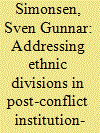

|
|
|
| 2 |
ID:
132531


|
|
|
|
|
| Publication |
2014.
|
| Summary/Abstract |
Afghanistan has been the global epicenter of heroin production for the past decade. Heroin networks and drug lords present a principal impediment to security, state building, and democratic governance. Beyond the national boundaries, Afghan-originated heroin creates enormous challenges for international security by financing terrorism, instigating corruption, killing nearly 100,000 users worldwide every year, undermining public order, and debilitating economic development. The devastating impacts of the Afghan heroin trade have spilled over into Southwest Asia, Central Asia, Russia, China, the Balkans, and Europe. Because Turkey stands on the shortest transit pathway between Southwest Asia and Europe, it is intensively exposed to illicit flows of Afghan heroin along the Balkan Route. Transnational crime syndicates have been exploiting Turkish territories for decades for the purpose of trafficking heroin to European markets. This paper discusses Afghan heroin as an international security conundrum. It further seeks to explore the dimensions of the threat in Turkey, new patterns in heroin trafficking, and profiles and operation modes of transnational syndicates. The analyses are based upon the scrutiny of important case files, national seizure database, and annual KOM provincial questionnaires. In conclusion, the paper puts forward policy recommendations for security elites both in Turkey and in other states affected by the illicit trade of Afghan heroin.
|
|
|
|
|
|
|
|
|
|
|
|
|
|
|
|
| 3 |
ID:
173911
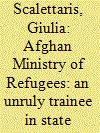

|
|
|
|
|
| Summary/Abstract |
This article looks at the interactions between the officials of the United Nations High Commissioner for Refugees (UNHCR)’s mission in Afghanistan and the heads of the Afghan Ministry of Refugees in the mid-2000s. It examines the rationales that guide officials at both the UNHCR and the ministry, as a way of unpacking the politics of state capacity building in post-2001 Afghanistan. The first section looks at the tense relationship between the two bodies from the point of view of UN officials, who strive to redress a ministry portrayed as ‘incapable’. By looking in turn at the fundaments of the political legitimacy of the Afghan state, at how international intervention transforms the Afghan political arena, and at Afghanistan’s position in global power relations, the following sections identify three rationales that can be ascribed to ministry officials, namely reconciling internal and external state legitimacy, strategic resource tapping and resistance to inter-state hegemony. From its standpoint at the juncture between an ‘external’ and a ‘local’ institution, the article ultimately stresses the importance of gaining epistemological distance from the peace building project in order to consider ‘local’ actors as full political actors.
|
|
|
|
|
|
|
|
|
|
|
|
|
|
|
|
| 4 |
ID:
082480
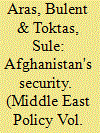

|
|
|
| 5 |
ID:
140331
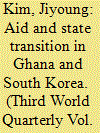

|
|
|
|
|
| Summary/Abstract |
This paper examines the questions of why and how foreign assistance was utilised successfully in South Korea but less so in Ghana, with a focus on the role of aid in the process of state building and state transition in these two countries. As multiple policy makers and scholars have noted, in 1957 South Korea and Ghana shared similar levels of GDP per capita, yet South Korea then achieved rapid economic development and democracy in one generation, while Ghana suffered from slow development and a general deterioration of the standard of living. In this study I adopt a comparative historical research method to explain the divergent paths of these two countries, with a special focus on the impact of foreign assistance on state transitions. I argue that contextual factors – including the effect of the colonial legacy in each of these two regions in shaping modern states, and the specific characteristics of foreign assistance intervention – provide useful insights in explaining the differential impact of aid on state building and state transition in Ghana and in South Korea.
|
|
|
|
|
|
|
|
|
|
|
|
|
|
|
|
| 6 |
ID:
108123
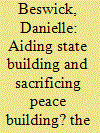

|
|
|
|
|
| Publication |
2011.
|
| Summary/Abstract |
This article explores the relationship between the UK and Rwanda, using the lens of the UK Department for International Development's integrated approach to state building and peace building in fragile and conflict-affected states. It identifies a number of priorities for UK aid under such a framework, but shows that in the case of Rwanda these have not been foregrounded in the bilateral aid relationship. The article suggests a number of reasons for this, arguing that, by refusing to acknowledge or address Rwanda's deviations from what was considered a positive development trajectory, the UK is becoming internationally isolated in its support for the rpf regime. It concludes that, while this bilateral relationship may support achievement of stability and relative security in Rwanda, promoting such a narrow form of state building is detrimental to more holistic peace building, both nationally and regionally.
|
|
|
|
|
|
|
|
|
|
|
|
|
|
|
|
| 7 |
ID:
083258
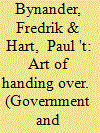

|
|
|
| 8 |
ID:
065239
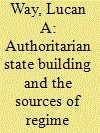

|
|
|
| 9 |
ID:
069167
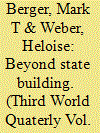

|
|
|
| 10 |
ID:
186688
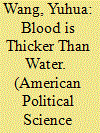

|
|
|
|
|
| Summary/Abstract |
A long tradition in social sciences scholarship has established that kinship-based institutions undermine state building. I argue that kinship networks, when geographically dispersed, cross-cut local cleavages and align the incentives of self-interested elites in favor of building a strong state, which generates scale economies in providing protection and justice throughout a large territory. I evaluate this argument by examining elite preferences related to a state-building reform in eleventh century China. I map politicians’ kinship networks using their tomb epitaphs and collect data on their political allegiances from archival materials. A statistical analysis demonstrates that a politician’s support for state building increases with the geographic size of his kinship network, controlling for a number of individual, family, and regional characteristics. My findings highlight the importance of elite social structure in facilitating state development and help to advance our understanding of state building in China—a useful, yet understudied, counterpoint to the Eurocentric literature.
|
|
|
|
|
|
|
|
|
|
|
|
|
|
|
|
| 11 |
ID:
104323
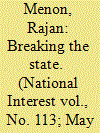

|
|
|
|
|
| Publication |
2011.
|
| Summary/Abstract |
THE MIDDLE East roils and one fact is certain: interventions end badly. For intervention leads to postwar reconstruction and postwar reconstruction leads to failure.
|
|
|
|
|
|
|
|
|
|
|
|
|
|
|
|
| 12 |
ID:
077178
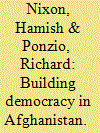

|
|
|
| 13 |
ID:
133578
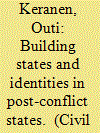

|
|
|
|
|
| Publication |
2014.
|
| Summary/Abstract |
An integral part of state formation processes is identity-building: 'making one out of many' as Walzer puts it. This is also true in terms of contemporary, internationally led statebuilding projects. This dimension of international statebuilding is important, as fundamental questions pertaining to belonging are as important to successful post-conflict process as institutional arrangements; in fact, assumptions about identities and group boundaries guide the technical decisions on institutional and governance structures. The central aim of this paper is to reflect upon identity-construction as a part of post-conflict statebuilding through exploring how historical and more recently invented symbols are deployed to construct a specific sense of belonging. The analysis finds a multiplicity of identity-building projects that advance different visions of community and belonging. The outcome is politicised and contentious visual, everyday landscape that legitimises competing local statebuilding projects (grounded in the distinctions between Bosnian peoples), while undermining peacebuilding and reconciliation. Yet, rather than indicating a primordial antagonisms or incompatible 'liberal' and 'local' norms, the conflicts over symbols (and ultimately, identities) between international and local agents are indicative of wider disagreements over how the Bosnian state ought to be organised and are fuelled by the institutional structures of the country and the weaknesses in the international statebuilding
|
|
|
|
|
|
|
|
|
|
|
|
|
|
|
|
| 14 |
ID:
074910
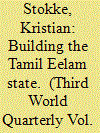

|
|
|
|
|
| Publication |
2006.
|
| Summary/Abstract |
Sri Lanka's civil war has created a political – territorial division between the government of Sri Lanka and the Liberation Tigers of Tamil Eelam (ltte), where ltte is engaged in a process of state building within the areas they control. The article examines this state formation with an emphasis on the functions and forms of governance that are embedded in the new state institutions. It is observed that the emerging state formation has a strong focus on external and internal security, with an additional emphasis on social welfare and economic development. In terms of governance, the ltte state apparatus is marked by authoritarian centralisation with few formal mechanisms for democratic representation, but there are also partnership arrangements and institutional experiments that may foster more democratic forms of representation and governance. Hence, resolving the security problem in tandem with political transformations towards democratic governance remain prime challenges for peace building in northeast Sri Lanka.
|
|
|
|
|
|
|
|
|
|
|
|
|
|
|
|
| 15 |
ID:
143282
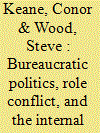

|
|
|
|
|
| Summary/Abstract |
Among the many challenges confronting the United States and its allies in Afghanistan were cohesion and communication problems in state-building programs. Merging role theory and bureaucratic politics approaches, this article argues that US Provincial Reconstruction Teams (PRTs), the composite groups charged with implementing these programs, suffered from incompatibilities between sectors of government, among which the military was dominant. US PRTs were affected by role conflict, resulting from varying and often competing organizational cultures with divergent role conceptions.
|
|
|
|
|
|
|
|
|
|
|
|
|
|
|
|
| 16 |
ID:
191963
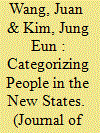

|
|
|
|
|
| Summary/Abstract |
What motivates states’ choice of social classification? Existing explanations highlight scientific beliefs of modern states or social engineering by ideological regimes. Focusing on the initial state-building period of two Communist regimes, China and North Korea, this article complements the existing literature and suggests that social classification reflects three missions of political leaders: regime distinction, governance, and power consolidation. Population categories are created to distinguish the new government from the old, to selectively provide welfare, and to attack political opponents. The varying weight of the missions and their manifestation in social classification depend on new ruling elites’ cohesion and past experiences. This comparative historical analysis sheds light on the rise of political chaos in China and the personalistic dictatorship in North Korea in the 1970s.
|
|
|
|
|
|
|
|
|
|
|
|
|
|
|
|
| 17 |
ID:
152308
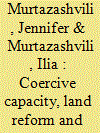

|
|
|
|
|
| Summary/Abstract |
This article compares four historical periods in Afghanistan to better understand whether land reform in the post-2001 context will improve prospects for political order. Its central finding is that political order can be established without land reform provided that the state is able to establish and maintain coercive capacity. However, the cost of establishing political order mainly through coercion is very low levels of economic development. We also find that when land reform was implemented in periods of weak or declining coercive capacity, political disorder resulted from grievances unrelated to land issues. In addition, land reforms implemented in the context of highly centralized political institutions increased property insecurity. This suggests the importance of investing in coercive capacity alongside land reform in the current context but also that establishing inclusive political institutions prior to land reform will increase its chances of success.
|
|
|
|
|
|
|
|
|
|
|
|
|
|
|
|
| 18 |
ID:
159361
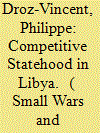

|
|
|
|
|
| Summary/Abstract |
Libya in 2011 witnessed a real process of political change, though different from all the policy-oriented jargon equating transition with a teleological transition to democracy. Due to the resilience of the Qadhafi regime in power and with the essential role of NATO intervention, the process was eased out by a eight-month civil war. Governance in post-Qadhafi Libya was not done through the rebuilding of centralized authorities. But it took the specific form of the emergence of multiple non-state actors embedded in local dynamics and then connected with weakened central authorities that had access to the huge Libyan resources. That raised complex questions about the quality of this mode of governance, especially at a time of pressing problems for Libya and its neighbors, whether direct ones (Tunisia, Egypt, Mali) or farther countries across the Mediterranean sea: terrorism with the expansion of Da’esh into the country and flows of refugees crossing Libya’s uncontrolled borders and flowing into Italy and then Europe by thousands.
|
|
|
|
|
|
|
|
|
|
|
|
|
|
|
|
| 19 |
ID:
090420
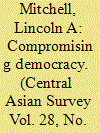

|
|
|
|
|
| Publication |
2009.
|
| Summary/Abstract |
This article argues that the since the Rose Revolution, the Georgian government led by President Mikheil Saakashvili has created a false dichotomy between democracy and state building. They have prioritized the latter. Initially, in areas such as reducing bureaucracy, combating petty corruption, improving tax collection, service delivery and infrastructure, the government succeeded in rebuilding the Georgian state. However, because issues of democracy were ignored, efforts to strengthen the Georgian state were not as successful as they might have been. Moreover, the absence of sufficient democracy has contributed to poor decision making, most notably in the run-up to the August war, which ultimately has undermined the major state building accomplishments in Georgia since 2004. Accordingly, any efforts to repair the damage from that war and rebuild the state will be unsuccessful unless they incorporate meaningful democratic reforms.
|
|
|
|
|
|
|
|
|
|
|
|
|
|
|
|
| 20 |
ID:
107666
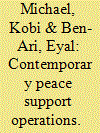

|
|
|
|
|
| Publication |
2011.
|
| Summary/Abstract |
In this article the authors examine two set of issues that constrain contemporary peace support operations (PSOs): one centered on the kinds of knowledge prevalent in PSOs and the second involving the organizational structures that characterize them. The authors' aim is to show the deep discursive and structural limitations and contradictions that continue to characterize the actions of armed forces and the dominance of militaristic thinking within PSOs. This article centers on multidimensional peacekeeping marked by emphasizing two main points in regard to the complex nature of such peacekeeping. First, Western military thinking is still dominant in the professional discourse of peacekeeping despite the fact that in many cases it is less relevant to the arenas where it is applied (in weakened or failed states). Second, forces in second-generation peacekeeping missions are by definition a form of hybrid organizations, and therefore conceptual changes in regard to PSOs not only involve the realm of knowledge but also entail practical consequences for the very organizational means used to achieve their aims. The authors' analysis demonstrates the blending, hybridization, and linkages that are an essential part of PSOs as processes that carry both advantages and disadvantages for organizational action.
|
|
|
|
|
|
|
|
|
|
|
|
|
|
|
|
|
|
|
|
|